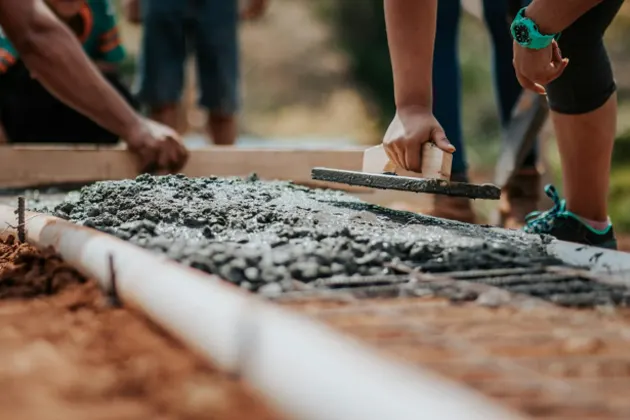Concrete professionals, whether contractors, masons, or decorative finishers, rely on a range of tools to ensure their projects are executed with precision and efficiency. These tools not only aid in the application of concrete but also enhance the quality of the finished product. Investing in the right equipment can significantly impact the success of jobs, leading to better results and increased client satisfaction. Here’s a look at some essential tools that every concrete-related professional should consider owning.
Concrete Mixers
Concrete mixers are vital for any concrete professional. They ensure that the ingredients are mixed thoroughly, saving time and effort during projects. A good mixer should have a powerful motor, a durable drum, and an easy-to-use control panel. Professionals often opt for tow-behind mixers for larger jobs, while smaller and portable mixers work well for residential projects. Ultimately, the choice of mixer depends on the scale of work being undertaken. Additionally, an efficient mixer minimizes the chances of dry pockets or improperly mixed ratios, ensuring that the final product maintains its strength and durability. Selecting a concrete mixer that fits your specific needs can make all the difference in your workflow and final outcomes.
Float and Trowel Sets
A well-organized float and trowel set is indispensable for creating a smooth, professional finish on concrete surfaces. These tools are necessary for both initial smoothing and final polish. A variety of floats, including magnesium, rubber, and wood floats, are available for different finishes and textures. Trowels, on the other hand, come in various shapes and sizes, each serving unique applications, such as corner finishing or large-area smoothing. What’s more, modern trowel designs often include ergonomic handles that reduce strain on the hands during extended use. To achieve optimal results, professionals must ensure that they use the right float and trowel for the task. This attention to detail can set apart a mediocre job from an outstanding finished project.
Floor Grinding Equipment
Floor grinding equipment, including machines and diamond blades, is essential for achieving smooth and polished concrete surfaces. These tools allow professionals to prepare and finish surfaces efficiently and effectively. Choosing the right floor grinder depends on the thickness of the concrete to be worked on and the desired finish. High-quality machinery, like Lavina equipment, offers powerful performance and durability, catering to both large commercial jobs and smaller residential projects. Proper training on operating these machines is crucial to achieve the best results and prevent damage during the process. Overall, investing in good floor grinding equipment can greatly enhance the quality of your projects and make handling large tasks simpler.
Vibrators
Concrete vibrators are essential for eliminating air pockets and ensuring a solid mix, making them a crucial tool for any concrete professional. By inserting a vibrator into freshly poured concrete, air is released, which prevents imperfections like honeycombing and weak points in the structure. There are different types of vibrators, including internal and external options, each with its advantages depending on the situation. Internal vibrators, for instance, are ideal for compacting dense concrete mixes, while external vibrators work better in thinner applications. Properly utilized vibrators enhance the overall integrity of the concrete and reduce the likelihood of future issues. Investing in a good quality concrete vibrator could significantly increase the quality of your work while also speeding up the curing process.
Levels and Measuring Tools
Accurate measurements are vital in concrete work, making levels and measuring tools a must-have. Professionals should consider utilizing laser levels for precision over longer distances. Traditional spirit levels also remain reliable for smaller areas or adjustments. Additionally, measuring tapes and markers help ensure the correct dimensions are achieved before any concrete is poured. Any inconsistencies in measurements can lead to costly mistakes, which is why investing in quality measuring equipment is essential. To further enhance accuracy, some professionals also use digital measuring devices that provide immediate readings. In an industry where precision matters, the right tools can significantly affect the overall results and reduce waste.
Safety Gear
Working with concrete involves exposure to various hazards, making safety gear indispensable for any professional. Essential safety items include gloves, eye protection, and boots that resist punctures and slips. Proper respiratory protection may also be necessary, especially when working with powdered materials or during cutting processes. In addition, hard hats should be worn on job sites where falling objects are a risk. By prioritizing safety, professionals not only protect themselves but also set a standard for best practices in the industry. Regular training on safety measures further enhances awareness, ensuring a safer work environment. Ultimately, well-equipped professionals are better prepared to handle both routine tasks and unforeseen challenges.
The tools mentioned above are indispensable for concrete-related professionals and serve to streamline various processes within concrete work. Whether it’s about mixing, finishing, cutting, or ensuring safety, having the right equipment enhances not only efficiency but also the overall quality of the finished product. Investing in high-quality tools often results in higher job satisfaction and can lead to more referrals and repeat business. Therefore, as the industry evolves, professionals should regularly assess their toolkits to keep up with new innovations and technologies.











